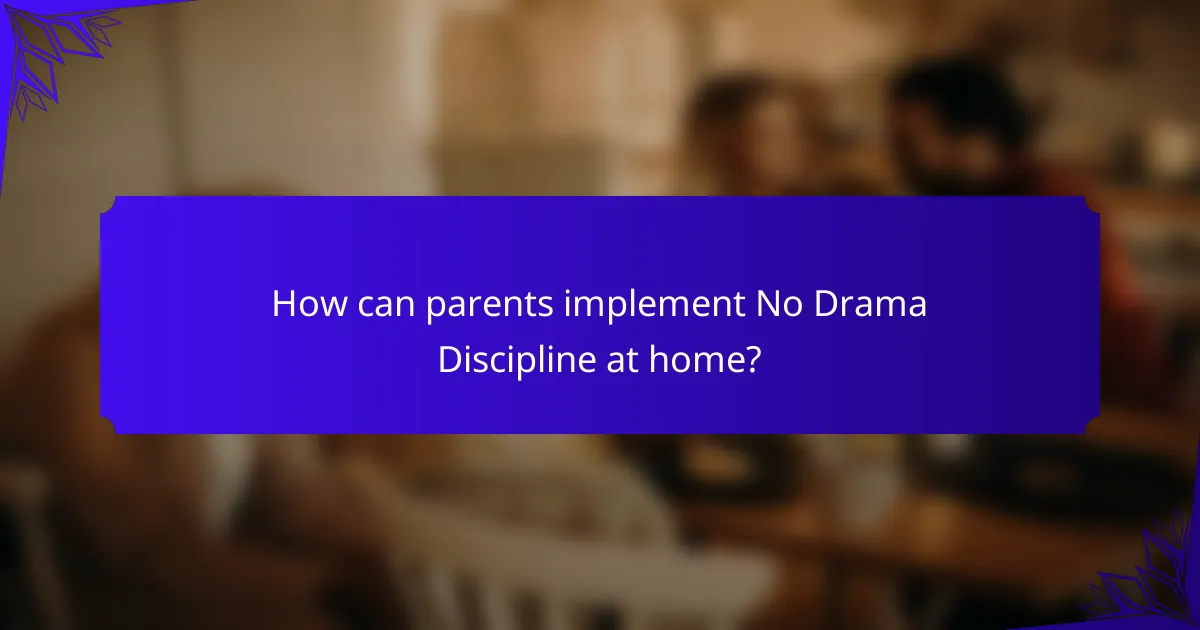Transforming learning through positive reinforcement can significantly enhance child development. No Drama Discipline fosters emotional intelligence, reduces stress, and improves communication. This method encourages thoughtful responses over reactive discipline. By implementing mindful conditioning, parents and educators can create supportive environments that promote growth and self-regulation.

What is No Drama Discipline?
No Drama Discipline is a method focused on fostering positive behavior in children through mindful conditioning. This approach emphasizes understanding emotions and promoting empathy, which transforms learning environments. Key attributes include reducing stress, enhancing communication, and building connections. The technique encourages parents and educators to respond thoughtfully rather than reactively, leading to better outcomes in child development. As a result, it nurtures a supportive atmosphere conducive to growth and learning.
How does positive reinforcement play a role?
Positive reinforcement is crucial in No Drama Discipline as it encourages desired behaviors through rewards. This approach fosters a positive learning environment, enhancing student engagement and motivation. By consistently acknowledging achievements, educators can cultivate resilience and self-esteem in learners. Research indicates that positive reinforcement leads to improved academic performance and behavioral outcomes. This method emphasizes the importance of mindful conditioning, helping students internalize positive behaviors for long-term success.
What are the core principles of mindful conditioning?
Mindful conditioning focuses on awareness and intentionality in behavior modification. Core principles include positive reinforcement, which encourages desirable behaviors, and mindfulness, promoting self-awareness in responses. Additionally, consistency in application fosters trust and security, enhancing learning outcomes. Lastly, reflection is key, allowing individuals to assess progress and adapt strategies effectively.

What are the universal benefits of No Drama Discipline?
No Drama Discipline fosters emotional intelligence and resilience in children. It promotes better communication, reduces negative behaviors, and enhances learning outcomes. This approach encourages understanding over punishment, leading to a more supportive environment. As a result, children develop stronger relationships and improved self-regulation skills.
How does it improve student engagement?
No Drama Discipline improves student engagement by fostering a positive learning environment. It emphasizes respectful communication and encourages students to take responsibility for their actions. This approach leads to increased participation and motivation, as students feel valued and understood. Research indicates that classrooms implementing positive reinforcement see a 20% rise in student engagement metrics. Additionally, mindful conditioning techniques help students develop self-regulation skills, further enhancing their involvement in the learning process.
In what ways does it foster emotional intelligence?
No Drama Discipline fosters emotional intelligence by promoting self-awareness and empathy in learners. It encourages students to recognize their emotions and understand the feelings of others. This approach enhances communication skills, leading to improved relationships and conflict resolution. As a result, learners develop greater resilience and adaptability, essential traits in emotionally intelligent individuals.
What impact does it have on classroom behavior?
No Drama Discipline positively impacts classroom behavior by fostering a supportive environment. This approach emphasizes positive reinforcement, which encourages students to engage constructively. As a result, classrooms experience reduced conflicts and increased cooperation among students. The focus on mindfulness helps students regulate their emotions, leading to a more focused learning atmosphere. Studies indicate that implementing these strategies can significantly decrease disruptive behaviors, enhancing overall academic performance.

What unique attributes set No Drama Discipline apart?
No Drama Discipline stands out due to its unique approach, focusing on emotional awareness and positive reinforcement. This method fosters a deeper connection between caregiver and child, promoting understanding over punishment. Unlike traditional discipline, it emphasizes mindfulness, helping children learn from their mistakes in a supportive environment. This approach not only improves behavior but also enhances emotional intelligence, making it a transformative tool in parenting and education.
How does it differ from traditional discipline methods?
No Drama Discipline emphasizes positive reinforcement and mindfulness, contrasting sharply with traditional discipline methods that often rely on punishment. Traditional methods focus on control and compliance, while No Drama Discipline fosters emotional connection and understanding. This approach promotes long-term behavioral change by addressing the underlying reasons for misbehavior rather than merely reacting to it. As a result, children learn self-regulation and empathy, skills often overlooked in conventional discipline.
What role does empathy play in its application?
Empathy is crucial in No Drama Discipline as it fosters understanding and connection. By recognizing students’ emotions, educators can tailor positive reinforcement to individual needs, enhancing engagement. This mindful approach transforms learning environments, promoting emotional intelligence and resilience. Empathy also encourages open communication, allowing students to express themselves freely, which is essential for effective learning.
How does it promote a growth mindset?
No Drama Discipline promotes a growth mindset by encouraging resilience and adaptability in learning. It emphasizes positive reinforcement, which builds confidence and motivation. Students learn to view challenges as opportunities, fostering a belief in their ability to grow. This approach cultivates a supportive environment that values effort and progress over perfection. As a result, learners develop a proactive attitude toward obstacles, enhancing their overall educational experience.

What are some rare but notable traits of No Drama Discipline?
No Drama Discipline emphasizes emotional regulation and empathy, which are rare but notable traits. This approach fosters a deeper connection between parents and children, enhancing communication and understanding. Additionally, it promotes self-reflection in both parties, encouraging growth and accountability. Another unique aspect is its focus on mindfulness, allowing caregivers to respond thoughtfully rather than react impulsively. These traits collectively create a nurturing environment conducive to learning and personal development.
How can it be adapted for diverse learning environments?
No Drama Discipline can be adapted for diverse learning environments by incorporating flexible strategies that meet varying student needs. These strategies include using positive reinforcement tailored to individual behaviors, fostering a supportive atmosphere, and implementing mindful conditioning techniques.
For example, in a traditional classroom, teachers can establish clear expectations and provide consistent feedback to encourage positive behaviors. In online settings, educators can utilize digital tools to create interactive experiences that reinforce learning.
Additionally, diverse cultural backgrounds can be acknowledged by integrating culturally relevant examples and practices, enhancing engagement and relatability. This adaptability ensures that all students benefit from a positive learning experience, regardless of their environment.
What innovative techniques have emerged from its practice?
Innovative techniques from No Drama Discipline include mindful conditioning and positive reinforcement strategies. These methods foster emotional regulation and enhance student engagement. For example, educators implement reflective practices that encourage students to understand their emotions and responses. This approach leads to improved classroom dynamics and promotes a supportive learning environment. As a result, educators report higher student motivation and reduced behavioral issues.

How can parents implement No Drama Discipline at home?
Parents can implement No Drama Discipline at home by focusing on positive reinforcement and mindful conditioning. Start by establishing a calm environment where children feel safe to express their emotions. Use empathetic communication to validate feelings, helping children understand their emotions and reactions. Set clear expectations and consistent consequences, reinforcing desired behaviors with praise and rewards. Encourage problem-solving by involving children in discussions about their actions and choices, fostering responsibility and self-regulation. Regularly reflect on family dynamics to adapt strategies, ensuring discipline remains constructive and supportive.
What strategies can be used for effective communication?
Effective communication strategies include using positive reinforcement, active listening, and mindful conditioning. These methods foster a supportive environment, enhancing collaboration and understanding. Positive reinforcement encourages desired behaviors, while active listening ensures clarity. Mindful conditioning helps in managing emotions, leading to more constructive interactions.
How can parents model positive behavior?
Parents can model positive behavior by consistently demonstrating respect, empathy, and effective communication. This approach fosters a supportive environment for children. Positive reinforcement, such as praise for good behavior, encourages children to emulate these traits. Mindful conditioning helps in establishing routines that reinforce desired behaviors, creating a lasting impact on children’s development. Engaging in active listening and validating children’s feelings further strengthens this modeling, making it a unique and effective strategy in parenting.

What are the common challenges faced in applying No Drama Discipline?
The common challenges in applying No Drama Discipline include inconsistent implementation, emotional regulation difficulties, resistance from children, and lack of parent-teacher collaboration. These obstacles can hinder the effectiveness of positive reinforcement strategies. Inconsistent application can lead to confusion for children about expectations. Emotional regulation is essential for both adults and children to respond mindfully. Resistance often arises when children are accustomed to traditional discipline methods. Finally, collaboration between parents and teachers is crucial for reinforcing the same principles at home and school.
How can resistance from children be addressed?
Implementing positive reinforcement and mindful conditioning effectively addresses resistance from children. Establish clear expectations and consistently acknowledge positive behavior. Use specific praise to reinforce desired actions, creating a supportive environment. Encourage open communication to understand children’s perspectives, fostering cooperation. As a result, children are more likely to respond positively and engage in learning.
What pitfalls should educators avoid?
Educators should avoid punitive measures that disrupt learning. Instead, focus on fostering a supportive environment through positive reinforcement. Common pitfalls include failing to establish clear expectations, neglecting individual student needs, and not modeling appropriate behavior. These can undermine student engagement and trust. Prioritize mindfulness in interactions to enhance classroom dynamics and promote a growth mindset.

What actionable tips can enhance the effectiveness of No Drama Discipline?
To enhance the effectiveness of No Drama Discipline, focus on consistent communication, emotional regulation, and positive reinforcement. Establish clear expectations to guide behavior. Use active listening to validate feelings, fostering a supportive environment. Implement reflective pauses to allow children to process emotions before responding. Encourage problem-solving by involving children in solutions, promoting autonomy. Regularly reinforce positive behaviors with specific praise to strengthen desired actions.
What best practices should be followed for consistency?
To ensure consistency in “No Drama Discipline,” follow these best practices: maintain clear communication, establish predictable routines, reinforce positive behaviors consistently, and model mindfulness in interactions. These practices create a supportive learning environment that emphasizes respect and understanding. Regularly assess and adjust strategies based on feedback to enhance effectiveness.
How can feedback be effectively integrated into the process?
Integrating feedback effectively into the No Drama Discipline process requires a structured approach. Start by creating a safe environment where students feel comfortable sharing their thoughts. Encourage regular check-ins to gather feedback on teaching methods and student engagement. Use this feedback to adjust strategies, ensuring they align with positive reinforcement principles. As a result, students become more invested in their learning journey, fostering a collaborative atmosphere that enhances overall educational outcomes.
What are the key metrics for assessing success?
Key metrics for assessing success in No Drama Discipline include student engagement, behavior improvement, academic performance, and teacher satisfaction. These metrics provide a comprehensive view of the program’s effectiveness.
| Metric | Description | Value |
|—————————-|————————————————–|————————|
| Student Engagement | Level of participation and interest in activities | Increased participation |
| Behavior Improvement | Reduction in disruptive behaviors | 30% decrease |
| Academic Performance | Changes in grades and test scores | 15% improvement |
| Teacher Satisfaction | Feedback from educators implementing the program | 85% positive feedback |


